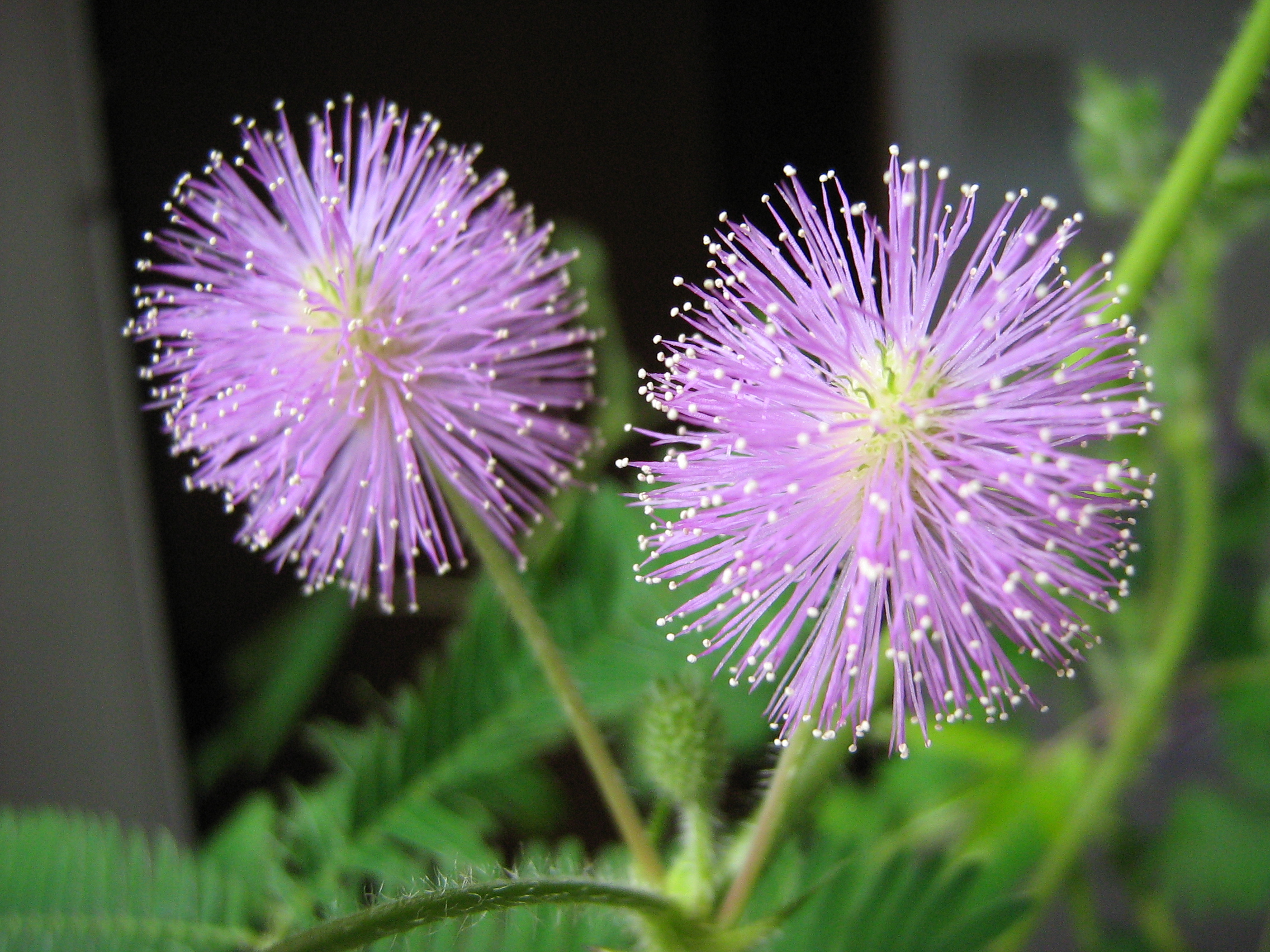|
Mimosa Ophthalmocentra
''Mimosa ophthalmocentra'', or ''jurema-embira'' ("red jurema"), is a tree in the family Fabaceae. It is native to Brazil. It is shrub or small tree about 3 to 5 m tall. Its blossoms come in long, narrow cylindrical spikes having yellowish white petals and a white stamen. The blossoms are sometimes found to have a pink tinge. The fruit is green, sometimes with red or purple, flat, about 8 cm long and about 1 cm wide. The trunk grows to about 20 cm in diameter. Its wood has a density of about 1.12 g/cm3 and it makes good firewood. Traditional use Traditionally in northeast Brazil, for cases of cough and bronchitis, a water extract (decoction Decoction is a method of extraction by boiling herbal or plant material (which may include stems, roots, bark and rhizomes) to dissolve the chemicals of the material. It is the most common preparation method in various herbal-medicine systems. Dec ...) of ''Mimosa ophthalmocentra'' is made into a drink. ... [...More Info...] [...Related Items...] OR: [Wikipedia] [Google] [Baidu] |
Mart
Mart may refer to: * Mart, or marketplace, a location where people regularly gather for the purchase and sale of provisions, livestock, and other goods * Mart (broadcaster), a local broadcasting station in Amsterdam * Mart (given name) * Mart (Syriac), Syriac title for women saints * Mart, Texas, a community in the United States * Data mart, an approach to handling big data Abbreviations * Museum of Modern and Contemporary Art of Trento and Rovereto, a museum in Italy * Mississippi Aerial River Transit, a demolished gondola lift in New Orleans, Louisiana * Montachusett Regional Transit Authority * Multiple Additive Regression Trees, a commercial name of gradient boosting See also * Kmart * Walmart * Mard (other) {{disambiguation ... [...More Info...] [...Related Items...] OR: [Wikipedia] [Google] [Baidu] |
Benth
George Bentham (22 September 1800 – 10 September 1884) was an English botanist, described by the weed botanist Duane Isely as "the premier systematic botanist of the nineteenth century". Born into a distinguished family, he initially studied law, but had a fascination with botany from an early age, which he soon pursued, becoming president of the Linnaean Society in 1861, and a fellow of the Royal Society in 1862. He was the author of a number of important botanical works, particularly flora. He is best known for his taxonomic classification of plants in collaboration with Joseph Dalton Hooker, his ''Genera Plantarum'' (1862–1883). He died in London in 1884. Life Bentham was born in Stoke, Plymouth, on 22 September 1800.Jean-Jacques Amigo, « Bentham (George) », in Nouveau Dictionnaire de biographies roussillonnaises, vol. 3 Sciences de la Vie et de la Terre, Perpignan, Publications de l'olivier, 2017, 915 p. () His father, Sir Samuel Bentham, a naval architect, was t ... [...More Info...] [...Related Items...] OR: [Wikipedia] [Google] [Baidu] |
Fabaceae
The Fabaceae or Leguminosae,International Code of Nomenclature for algae, fungi, and plants. Article 18.5 states: "The following names, of long usage, are treated as validly published: ....Leguminosae (nom. alt.: Fabaceae; type: Faba Mill. Vicia L.; ... When the Papilionaceae are regarded as a family distinct from the remainder of the Leguminosae, the name Papilionaceae is conserved against Leguminosae." English pronunciations are as follows: , and . commonly known as the legume, pea, or bean family, are a large and agriculturally important of |
Brazil
Brazil ( pt, Brasil; ), officially the Federative Republic of Brazil (Portuguese: ), is the largest country in both South America and Latin America. At and with over 217 million people, Brazil is the world's fifth-largest country by area and the seventh most populous. Its capital is Brasília, and its most populous city is São Paulo. The federation is composed of the union of the 26 States of Brazil, states and the Federal District (Brazil), Federal District. It is the largest country to have Portuguese language, Portuguese as an List of territorial entities where Portuguese is an official language, official language and the only one in the Americas; one of the most Multiculturalism, multicultural and ethnically diverse nations, due to over a century of mass Immigration to Brazil, immigration from around the world; and the most populous Catholic Church by country, Roman Catholic-majority country. Bounded by the Atlantic Ocean on the east, Brazil has a Coastline of Brazi ... [...More Info...] [...Related Items...] OR: [Wikipedia] [Google] [Baidu] |
Cough
A cough is a sudden expulsion of air through the large breathing passages that can help clear them of fluids, irritants, foreign particles and microbes. As a protective reflex, coughing can be repetitive with the cough reflex following three phases: an inhalation, a forced exhalation against a closed glottis, and a violent release of air from the lungs following opening of the glottis, usually accompanied by a distinctive sound. Frequent coughing usually indicates the presence of a disease. Many viruses and bacteria benefit, from an evolutionary perspective, by causing the host to cough, which helps to spread the disease to new hosts. Most of the time, irregular coughing is caused by a respiratory tract infection but can also be triggered by choking, smoking, air pollution, asthma, gastroesophageal reflux disease, post-nasal drip, chronic bronchitis, lung tumors, heart failure and medications such as angiotensin-converting-enzyme inhibitors (ACE inhibitors). Treatment should t ... [...More Info...] [...Related Items...] OR: [Wikipedia] [Google] [Baidu] |
Bronchitis
Bronchitis is inflammation of the bronchi (large and medium-sized airways) in the lungs that causes coughing. Bronchitis usually begins as an infection in the nose, ears, throat, or sinuses. The infection then makes its way down to the bronchi. Symptoms include coughing up sputum, wheezing, shortness of breath, and chest pain. Bronchitis can be acute or chronic. Acute bronchitis usually has a cough that lasts around three weeks, and is also known as a chest cold. In more than 90% of cases the cause is a viral infection. These viruses may be spread through the air when people cough or by direct contact. A small number of cases are caused by a bacterial infection such as ''Mycoplasma pneumoniae'' or ''Bordetella pertussis''. Risk factors include exposure to tobacco smoke, dust, and other air pollution. Treatment of acute bronchitis typically involves rest, paracetamol (acetaminophen), and nonsteroidal anti-inflammatory drugs (NSAIDs) to help with the fever. Chronic bronchi ... [...More Info...] [...Related Items...] OR: [Wikipedia] [Google] [Baidu] |
Decoction
Decoction is a method of extraction by boiling herbal or plant material (which may include stems, roots, bark and rhizomes) to dissolve the chemicals of the material. It is the most common preparation method in various herbal-medicine systems. Decoction involves first drying the plant material; then mashing, slicing, or cutting the material to allow for maximum dissolution; and finally boiling in water to extract oils, volatile organic compounds and other various chemical substances. Occasionally, aqueous ethanol or glycerol may be used instead of water. Decoction can be used to make tisanes, tinctures and similar solutions. Decoctions and infusions may produce liquids with differing chemical properties, as the temperature or preparation difference may result in more oil-soluble chemicals in decoctions versus infusions. The process can also be applied to meats and vegetables to prepare bouillon or stock, though the term is typically only used to describe boiled plant extracts, usua ... [...More Info...] [...Related Items...] OR: [Wikipedia] [Google] [Baidu] |
Mimosa
''Mimosa'' is a genus of about 590 species of herbs and shrubs, in the mimosoid clade of the legume family Fabaceae. The generic name is derived from the Greek word (''mimos''), an "actor" or "mime", and the feminine suffix -''osa'', "resembling", suggesting its 'sensitive leaves' which seem to 'mimic conscious life'. Two species in the genus are especially notable. One is ''Mimosa pudica'', commonly known as touch-me-not, which folds its leaves when touched or exposed to heat. It is native to southern Central and South America but is widely cultivated elsewhere for its curiosity value, both as a houseplant in temperate areas, and outdoors in the tropics. Outdoor cultivation has led to weedy invasion in some areas, notably Hawaii. The other is ''Mimosa tenuiflora'', which is best known for its use in shamanic ayahuasca brews due to the psychedelic drug dimethyltryptamine found in its root bark. Taxonomy The taxonomy of the genus ''Mimosa'' has gone through several periods of ... [...More Info...] [...Related Items...] OR: [Wikipedia] [Google] [Baidu] |
Flora Of Brazil
The wildlife of Brazil comprises all naturally occurring animals, plants, and fungi in the South American country. Home to 60% of the Amazon Rainforest, which accounts for approximately one-tenth of all species in the world, Brazil is considered to have the greatest biodiversity of any country on the planet. It has the most known species of plant Plants are predominantly photosynthetic eukaryotes of the kingdom Plantae. Historically, the plant kingdom encompassed all living things that were not animals, and included algae and fungi; however, all current definitions of Plantae exclud ...s (55,000), freshwater fish (3,000), and mammals (over 689). It also ranks third on the list of countries with the most bird species (1,832) and second with the most reptile species (744). The number of fungal species is unknown but is large.Da Silva, M. and D.W. Minter. 1995. ''Fungi from Brazil recorded by Batista and Co-workers''. Myc ... [...More Info...] [...Related Items...] OR: [Wikipedia] [Google] [Baidu] |






